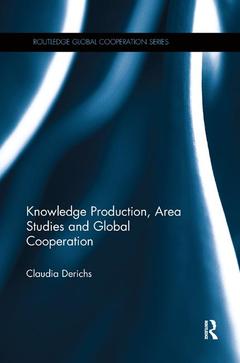Knowledge Production, Area Studies and Global Cooperation Routledge Global Cooperation Series
Auteur : Derichs Claudia

Whereas Area Studies and cross-border cooperation research conventionally demarcates groups of people by geographical boundaries, individuals might in fact feel more connected by shared values and principles than by conventional spatial dimensions. Knowledge Production, Area Studies and Global Cooperation asks what norms and principles lead to the creation of knowledge about cross-border cooperation and connection. It studies why theories, methods, and concepts originate in one place rather than another, how they travel, and what position the scholar adopts while doing research, particularly ?in the field?.
Taking case studies from Asia, the Middle East and North Africa, the book links the production of alternative epistemologies to the notion of global cooperation and reassesses the ways in which the concept of connectedness can be applied at the translocal and individual rather than the formal international and collective level.
Knowledge Production, Area Studies and Global Cooperation provides an innovative and critical approach towards established means of producing knowledge about different areas of the world, demonstrating that an understanding of pluri-local connectivity should be integrated into the production of knowledge about different areas of the world and the behavioural dimension of global cooperation. By shifting the view from the collective to the individual and from the formal to often invisible patterns of connectedness, this book provides an important fresh perspective which will be of interest to scholars and students of Area Studies, Politics, International Relations and Development Studies.
- Introduction: Knowledge Production, Area Studies and Global Cooperation
- The Islamisation of Knowledge
- Review: Spill-over and diffusion
- Empirical case studies: Islamic economy and Islamic feminism
- At Home Away from Home (Emotional Geographies)
- Tunnel Views in Area Studies
- Connectivity and Cooperation: Concluding Thoughts
The problem of defining knowledge
Area studies and disciplines
Knowledge production, international relations and global cooperation
Part I: Alternative Epistemologies
Naguib Al-Attas: Islam and secularism
Isma’il Al-Faruqi: the tauhîdic worldview
Seyyed Hossein Nasr: sacred science
Fazlur Rahman: Islam and modernity
Evaluations of the Islamisation of knowledge project
IoK as a project of its time
Islamic resurgence
Islamisation in education and its political reception in Malaysia and Indonesia
Primary to tertiary education
Campus dakwah
Malaysia
Indonesia and the tarbiyah movement
Transregional connections
Diffusion into policymaking and economic practice
Laws and verdicts
Female perspectives on "Islamised" policymaking
Diffusion into economy
Conclusion
Assessing religion, economy and advocacy
Commodification, commercialization and aestheticisation of religion
The Islamisation of knowledge and its repercussions
Domestic political contexts
Beyond domestic politics
Islamic economy and sharî’aised workplaces
Gender justice and transnational Islamic feminism
Pulling the strings together
Part II: Areas and Pluri-Locality
Trans- and pluri-local settings
Knowledge entrepreneurs
Trans- and pluri-local networks
Translocal areas
Conclusion
Critical assessments of area studies
Scales and geographies
Areas and disciplines in postcolonial perspective
Conclusion
Cooperation on a global level
The cooperation hexagon and meccanomics
Religion and international cooperation
Epistemic approaches and behavioural dimensions
Knowledge production, area studies and global cooperation
Claudia Derichs is Professor of Comparative Politics and International Development Studies at Philipps University Marburg, Germany, and a senior associate fellow at the Käte Hamburger Kolleg/Centre for Global Cooperation Research in Duisburg, Germany. Her research interests are Muslim societies and political transition in Southeast Asia and the Middle East, as well as gender and development studies in Asia and the Middle East. She has published various books and articles on Malaysia, Indonesia, Japan and the Arab world, and is an advisor to several academic and political institutions, journals and think tanks. Prior to her studies of Japanese and Arabic, she worked as a journalist.
Date de parution : 01-2019
15.6x23.4 cm
Disponible chez l'éditeur (délai d'approvisionnement : 14 jours).
Prix indicatif 53,83 €
Ajouter au panierDate de parution : 04-2017
15.6x23.4 cm
Disponible chez l'éditeur (délai d'approvisionnement : 14 jours).
Prix indicatif 160,25 €
Ajouter au panierThèmes de Knowledge Production, Area Studies and Global Cooperation :
Mots-clés :
Muslim World; Naguib Al Attas; Biodiversity; Islamic Entrepreneurship; Climate Change; Nurcholish Madjid; Conservation; Islamic Economy; Environmental economics; Muslim Legal Tradition; Environmental policy; Conventional Area Studies; Environmental studies; Southeast Asian Studies; Sustainability; International Islamic Relief Organization; Sustainable development; Good Life; Mass Organisation Nu; Islamic Finance; Popular Religious Leaders; Paramadina University; Mohammad Natsir; International Monetary Fund; Knowledge Entrepreneurs; Muslim Women’s Rights Activists; Tarbiyah Movement; Translocal Subjectivities; Local Knowledge; Islamic Market Indices; Comparative Area Studies; Dakwah Movements; Western IR Theory



